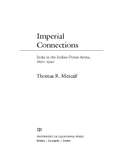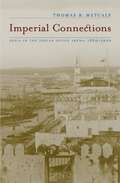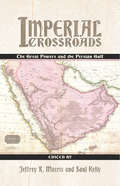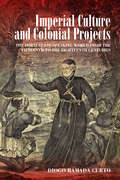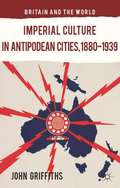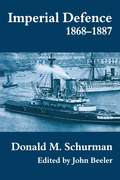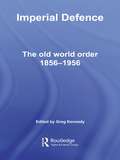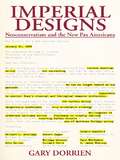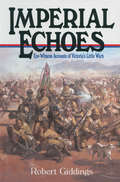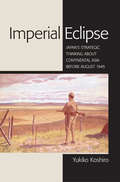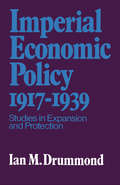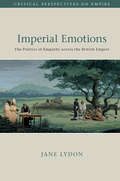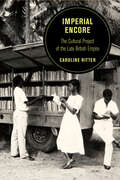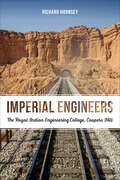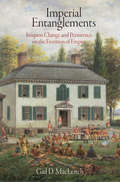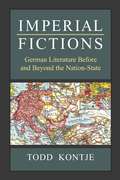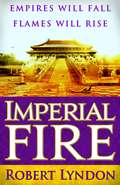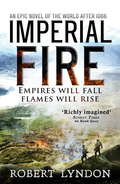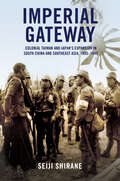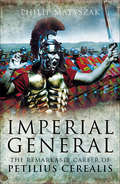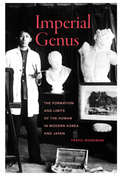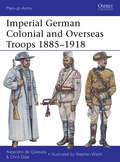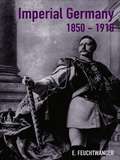- Table View
- List View
Imperial Connections
by Thomas R. MetcalfAn innovative remapping of empire, Imperial Connections offers a broad-ranging view of the workings of the British Empire in the period when the India of the Raj stood at the center of a newly globalized system of trade, investment, and migration. Thomas R. Metcalf argues that India itself became a nexus of imperial power that made possible British conquest, control, and governance across a wide arc of territory stretching from Africa to eastern Asia. His book, offering a new perspective on how imperialism operates, emphasizes transcolonial interactions and webs of influence that advanced the interests of colonial India and Britain alike. Metcalf examines such topics as law codes and administrative forms as they were shaped by Indian precedents; the Indian Army's role in securing Malaya, Africa, and Mesopotamia for the empire; the employment of Indians, especially Sikhs, in colonial policing; and the transformation of East Africa into what was almost a province of India through the construction of the Uganda railway. He concludes with a look at the decline of this Indian Ocean system after 1920 and considers how far India's participation in it opened opportunities for Indians to be a colonizing as well as a colonized people.
Imperial Connections: India in the Indian Ocean Arena, 1860-1920
by Thomas R. MetcalfAn innovative remapping of empire, Imperial Connections offers a broad-ranging view of the workings of the British Empire in the period when the India of the Raj stood at the center of a newly globalized system of trade, investment, and migration. Thomas R. Metcalf argues that India itself became a nexus of imperial power that made possible British conquest, control, and governance across a wide arc of territory stretching from Africa to eastern Asia. His book, offering a new perspective on how imperialism operates, emphasizes transcolonial interactions and webs of influence that advanced the interests of colonial India and Britain alike. Metcalf examines such topics as law codes and administrative forms as they were shaped by Indian precedents; the Indian Army's role in securing Malaya, Africa, and Mesopotamia for the empire; the employment of Indians, especially Sikhs, in colonial policing; and the transformation of East Africa into what was almost a province of India through the construction of the Uganda railway. He concludes with a look at the decline of this Indian Ocean system after 1920 and considers how far India's participation in it opened opportunities for Indians to be a colonizing as well as a colonized people.
Imperial Crossroads
by Saul Kelly Jeffrey R. MacrisFor centuries the world's Great Powers, along with their fleets, armies, and intelligence services, have been drawn to the Persian Gulf region. Lying at the junction of three great continents - Asia, Europe, and Africa - and sitting athwart the oceanic trade routes that link the cities of the world, the Gulf, like a magnet, has pulled superpowers into the shallow waters and adjacent lands of the 600 mile long appendage of the Indian Ocean. An observer at Hormuz at the mouth of the Gulf would alternately have watched pass in the 15th century the treasure ships of Chinese Admiral Zheng He, in the 16th century the caravels of Portuguese Admiral Afonso de Albuquerqe, in the 17th century the merchant ships of the Dutch East India Company, in the 18th to the 20th centuries the frigates and steamships of the British, and finally in the late 20th century to today, the cruisers and aircraft carriers of the U.S. Fifth Fleet. Perhaps in the future, Americans may be supplanted by the Indians, or perhaps the Chinese.In the Great Powers' comings and goings since the 1400s, several consistent broad interests emerged. For the majority of this time, for example, the superpowers entered the Gulf region not to colonize, as the Europeans did in other places, but rather to further trade, which in the 20th century increasingly included oil. They also sought a military presence in the Gulf to protect seaborne flanks to colonial possessions further east on the Indian sub-continent and beyond (India, in fact, has long cast a shadow over the Gulf, given its historic trade and cultural ties to the Gulf region, strong ties that continue today). In their geo-political jockeying, furthermore, the Great Powers sought to deprive their rivals access to the states bordering the Gulf region. In tending to these enduring interests inside the Strait of Hormuz, the Great Powers through history concentrated their trade, political, and military presence along the littorals. Not surprisingly, their navies have played a substantive role.Imperial Crossroads: The Great Powers and the Persian Gulf is a collection of connected chapters, each of which investigates a different perspective in the broader subject of the Great Powers and their involvement with the states of the Persian Gulf. This volume concentrates on four western nations - Portugal, Holland, Britain, and the United States - and concludes with a look at the possible future involvement of two rising Asian powers - China and India.
Imperial Culture and Colonial Projects: The Portuguese-Speaking World from the Fifteenth to the Eighteenth Centuries
by Diogo Ramada CurtoBeyond the immeasurable political and economic changes it brought, colonial expansion exerted a powerful effect on Portuguese culture. And as this book demonstrates, the imperial culture that emerged over the course of four centuries was hardly a homogeneous whole, as triumphalist literature and other cultural forms mingled with recurrent doubts about the expansionist project. In a series of illuminating case studies, Ramada Curto follows the history and perception of major colonial initiatives while integrating the complex perspectives of participating agents to show how the empire’s life and culture were richly inflected by the operations of imperial expansion.
Imperial Culture in Antipodean Cities, 1880–1939
by John GriffithsDrawing on a wealth of primary and secondary sources, this book explores how far imperial culture penetrated antipodean city institutions. It argues that far from imperial saturation, the city 'Down Under' was remarkably untouched by the Empire.
Imperial Decline: Russia’s Changing Role in Asia
by Alvin Z. Rubinstein Stephen BlankThis collection of essays by a distinguished group of international scholars is the first to analyze current Russian policies in China, Japan, and the two Koreas. Although Russia was a rising power in Asia a century ago, historical and political events since then have diverted attention from this potential site of development.The essays in Imperial Decline describe the major changes that have occurred in Russia's relations with China, Japan, and South Korea under Boris Yeltin's presidency, speculating about both Russia's future in the region and the impact this future could have on relations with the United States. Contributors to this volume demonstrate how incoherent taxation and investment, uncoordinated and contradictory economic policies, runaway inflation and currency instability, and problems of defense now constrain the possibility of Russia expanding its economic influence in the region. This book is essential for students and scholars of international relations, foreign policy, and Russian history.Contributors. Stephen J. Blank, Bruce A. Elleman, Harry Gelman, Hongchan Chun , Rajan Menon, Alvin Z. Rubinstein, Oles M. Smolansky, Henry Trofimenko, Charles E. Ziegler
Imperial Defence, 1868-1887 (Cass Series: Naval Policy and History #Vol. 12)
by Donald MacKenzie SchurmanThe technical transformation of the Royal Navy during the Victorian era posed many design, tactical and operational problems for administrators from the 1830s onwards. The switch from sail to steam required the creation of a system of defended coaling stations and a greater infrastructure.
Imperial Defence: The Old World Order, 1856–1956 (Cass Military Studies)
by Greg KennedyThis new collection of essays, from leading British and Canadian scholars, presents an excellent insight into the strategic thinking of the British Empire. It defines the main areas of the strategic decision-making process that was known as 'Imperial Defence'. The theme is one of imperial defence and defence of empire, so chapters will be historiographical in nature, discussing the major features of each key component of imperial defence, areas of agreement and disagreement in the existing literature on critical interpretations, introducing key individuals and positions and commenting on the appropriateness of existing studies, as well as identifying a raft of new directions for future research.
Imperial Designs: Neoconservatism and the New Pax Americana
by Gary DorrienThis work argues that the influence of neoconservatives has been none too small and all too important in the shaping of this monumental doctrine and historic moment in American foreign policy. Through a fascinating account of the central figures in the neoconservative movement and their push for war with Iraq, he reveals the imperial designs that have guided them in their quest for the establishment of a global Pax Americana.
Imperial Echoes: Eye-Witness Accounts of Victoria's Little Wars
by Robert GiddingsThe years between the Battle of Waterloo in 1815 and the outbreak of the First World War in 1914 are sometimes described as 'The Long Peace', the there were in fact British Soldiers fighting somewhere in the world throughout the whole of that period, usually in an effort to restore order in some far-flung parts of the Empire 'upon which the sun never set.' Although these campaigns have been well documented by numerous historians, Robbert Giddings, well known as author, journalist and writer for radio and television, here adopts an entirely new approach and relies largely on first-hand accounts to show not mealy what happened but what it was actually like to be there. His sources are many and varied and not confined the the soldier's own records. Nothing, for instance, could surpass in vividness Florentia Sale's brilliant account of the terrible retreat from Kabulin 1842. Due respect is also paid to the courage of the opposition. As Lieutenant Charles Townshend wrote after Omdurman in 1898, 'The Valour of these poor half-starved Dervishes...would be graced by Thermopylae.' The book continues eye-witness accounts from the following campaigns and minor wars: Maratha, Gurkha, Burmese, Ashanti, opium, Afghan, Maori, Sikh, Kaffir, Persian, Abyssinian, Zulu, Boer, Egyptian, Sudanese and Matabele. The list alone shows how busy the British Soldier was throughout the nineteenth century. The text itself brilliantly recapture the nature of soldiering in that era.
Imperial Eclipse: Japan's Strategic Thinking about Continental Asia before August 1945
by Yukiko KoshiroThe "Pacific War" narrative of Japan's defeat that was established after 1945 started with the attack on Pearl Harbor, detailed the U.S. island-hopping campaigns across the Western Pacific, and culminated in the atomic bombings of Hiroshima and Nagasaki, Japan's capitulation, and its recasting as the western shore of an American ocean. But in the decades leading up to World War II and over the course of the conflict, Japan's leaders and citizens were as deeply concerned about continental Asia-and the Soviet Union, in particular-as they were about the Pacific theater and the United States. In Imperial Eclipse, Yukiko Koshiro reassesses the role that Eurasia played in Japan's diplomatic and military thinking from the turn of the twentieth century to the end of the war.Through unprecedented archival research, Koshiro has located documents and reports expunged from the files of the Japanese Cabinet, ministries of Foreign Affairs and War, and Imperial Headquarters, allowing her to reconstruct Japan's official thinking about its plans for continental Asia. She brings to light new information on the assumptions and resulting plans that Japan's leaders made as military defeat became increasingly certain and the Soviet Union slowly moved to declare war on Japan (which it finally did on August 8, two days after Hiroshima). She also describes Japanese attitudes toward Russia in the prewar years, highlighting the attractions of communism and the treatment of Russians in the Japanese empire; and she traces imperial attitudes toward Korea and China throughout this period. Koshiro's book offers a balanced and comprehensive account of imperial Japan's global ambitions.
Imperial Economic Policy 1917-1939
by Ian DrummondThis book offers a detailed account, based on primary source materials from Britain, Canada, and Australia, of the process by which the Empire settlement programme and the Ottawa Agreements were devised. It also traces the effects of both, placing them in the general contexts of British economic policy-making, imperial economic diplomacy and the contemporary concern with economic imperialism. Its special merits are twofold: a solid base in the documents and a development of the historical arguments and assessments with the aid of economic analysis. It should appeal to anyone who is interested in British political and economic history, or in Commonwealth history, especially in the twentieth century.
Imperial Emotions: The Politics of Empathy across the British Empire (Critical Perspectives on Empire)
by Jane LydonEmotions are not universal, but are experienced and expressed in diverse ways within different cultures and times. This overview of the history of emotions within nineteenth-century British imperialism focuses on the role of the compassionate emotions, or what today we refer to as empathy, and how they created relations across empire. Jane Lydon examines how empathy was produced, qualified and contested, including via the fear and anger aroused by frontier violence. She reveals the overlooked emotional dimensions of relationships constructed between Britain, her Australasian colonies, and Indigenous people, showing that ideas about who to care about were frequently drawn from the intimate domestic sphere, but were also developed through colonial experience. This history reveals the contingent and highly politicised nature of emotions in imperial deployment. Moving beyond arguments that emotions such as empathy are either 'good' or 'bad', this study evaluates their concrete political uses and effects.
Imperial Encore: The Cultural Project of the Late British Empire (Berkeley Series in British Studies #18)
by Caroline RitterIn the 1930s, British colonial officials introduced drama performances, broadcasting services, and publication bureaus into Africa under the rubric of colonial development. They used theater, radio, and mass-produced books to spread British values and the English language across the continent. This project proved remarkably resilient: well after the end of Britain’s imperial rule, many of its cultural institutions remained in place. Through the 1960s and 1970s, African audiences continued to attend Shakespeare performances and listen to the BBC, while African governments adopted English-language textbooks produced by metropolitan publishing houses. Imperial Encore traces British drama, broadcasting, and publishing in Africa between the 1930s and the 1980s—the half century spanning the end of British colonial rule and the outset of African national rule. Caroline Ritter shows how three major cultural institutions—the British Council, the BBC, and Oxford University Press—integrated their work with British imperial aims, and continued this project well after the end of formal British rule. Tracing these institutions and the media they produced through the tumultuous period of decolonization and its aftermath, Ritter offers the first account of the global footprint of British cultural imperialism.
Imperial Engineers: The Royal Indian Engineering College, Coopers Hill
by Richard HornseyEstablished in 1871 on the outskirts of London, the Royal Indian Engineering College at Coopers Hill was arguably the first engineering school in Britain. For thirty-five years the college helped staff the government institutions of British India responsible for the railways, irrigation systems, telegraph network, and forests. Founded to meet the high demand for engineers in that country, it was closed thirty-five years later because its educational innovations had been surpassed by Britain’s universities – on both occasions against the wishes of the Government of India. Imperial Engineers offers a complete history of the Royal Indian Engineering College. Drawing on the diaries of graduates working in India, the college magazine, student and alumni periodicals, and other archival documents, Richard Hornsey details why the college was established and how the students’ education prepared them for their work. Illustrating the impact of the college and its graduates in India and beyond, Imperial Engineers illuminates the personal and professional experiences of British men in India as well as the transformation of engineering education at a time of social and technological change.
Imperial Entanglements
by Gail D. MacleitchImperial Entanglements chronicles the history of the Haudenosaunee Iroquois in the eighteenth century, a dramatic period during which they became further entangled in a burgeoning market economy, participated in imperial warfare, and encountered a waxing British Empire. Rescuing the Seven Years' War era from the shadows of the American Revolution and moving away from the political focus that dominates Iroquois studies, historian Gail D. MacLeitch offers a fresh examination of Iroquois experience in economic and cultural terms. As land sellers, fur hunters, paid laborers, consumers, and commercial farmers, the Iroquois helped to create a new economic culture that connected the New York hinterland to a transatlantic world of commerce. By doing so they exposed themselves to both opportunities and risks.As their economic practices changed, so too did Iroquois ways of making sense of gender and ethnic differences. MacLeitch examines the formation of new cultural identities as men and women negotiated challenges to long-established gendered practices and confronted and cocreated a new racialized discourses of difference. On the frontiers of empire, Indians, as much as European settlers, colonial officials, and imperial soldiers, directed the course of events. However, as MacLeitch also demonstrates, imperial entanglements with a rising British power intent on securing native land, labor, and resources ultimately worked to diminish Iroquois economic and political sovereignty.
Imperial Fictions: German Literature Before and Beyond the Nation-State (Social History, Popular Culture, And Politics In Germany)
by Todd KontjeImperial Fictions explores ways in which writers from late antiquity to the present have imagined communities before and beyond the nation-state. It takes as its point of departure challenges to the discrete nation-state posed by globalization, migration, and European integration today, but then circles back to the beginnings of European history after the fall of the Roman Empire. Unlike nationalist literary historians of the nineteenth century, who sought the tribal roots of an allegedly homogeneous people, this study finds a distant mirror of analogous processes today in the fluid mixtures and movements of peoples. Imperial Fictions argues that it is time to stop thinking about today’s multicultural present as a deviation from a culturally monolithic past. We should rather consider the various permutations of “German” identities that have been negotiated within local and imperial contexts from the early Middle Ages to the present.
Imperial Fire
by Robert LyndonAN EPIC HISTORICAL QUEST SET AT THE DAWN OF THE AGE OF GUNPOWDER. In the world after 1066, vast empires clamor for dominance.From the Normans in the north to the Byzantines in the south, battles rage across Europe and around its fringes. But in the east, an empire still mightier stirs, wielding a weapon to rule the world: gunpowder. Seeking the destructive might of this 'fire drug,' the mercenary Vallon -- a man made of grit and earth as much as of flesh and blood -- is sent by the defeated Byzantine emperor on a secret and near-impossible quest to the far off land of Song Dynasty China. Alongside a squadron of highly trained soldiers, Vallon is accompanied by the learned physician Hero, hermit-like tracker Wayland and a young, ego-driven upstart named Lucas. All have their own reasons for going, all have secrets.It's a quest that will lead them across treacherous seas and arid desserts and into an uncharted land of mountains and plains beyond the Silk Road. Many will die...but the rewards could be extraordinary.
Imperial Fire
by Robert LyndonAD 1081: Vast empires struggle for dominance.From the Normans in the north to the Byzantines in the south, battles rage across Europe and around its fringes. But in the east, an empire still mightier stirs, wielding a weapon to rule the world: gunpowder.Seeking the destructive might of this 'fire drug', the mercenary Vallon is sent by the defeated Byzantine emperor on a near-impossible quest to the far-off land of Song Dynasty China. Leading a highly trained squadron, Vallon is accompanied by the physician Hero, Wayland the English hunter, and a young upstart named Lucas.All have their own reasons for going, all have secrets.It's a quest that leads them across treacherous seas and broiling deserts, and into the uncharted land of mountains and plains beyond the Silk Road. Many will die... but the rewards are unbelievable.
Imperial Gateway: Colonial Taiwan and Japan's Expansion in South China and Southeast Asia, 1895–1945
by Seiji ShiraneIn Imperial Gateway, Seiji Shirane explores the political, social, and economic significance of colonial Taiwan in the southern expansion of Japan's empire from 1895 to the end of World War II. Challenging understandings of empire that focus on bilateral relations between metropole and colonial periphery, Shirane uncovers a half century of dynamic relations between Japan, Taiwan, China, and Western regional powers. Japanese officials in Taiwan did not simply take orders from Tokyo; rather, they often pursued their own expansionist ambitions in South China and Southeast Asia. When outright conquest was not possible, they promoted alternative strategies, including naturalizing resident Chinese as overseas Taiwanese subjects, extending colonial police networks, and deploying tens of thousands of Taiwanese to war. The Taiwanese—merchants, gangsters, policemen, interpreters, nurses, and soldiers—seized new opportunities for socioeconomic advancement that did not always align with Japan's imperial interests. Drawing on multilingual archives in six countries, Imperial Gateway shows how Japanese officials and Taiwanese subjects transformed Taiwan into a regional gateway for expansion in an ever-shifting international order.Thanks to generous funding from the National Endowment for the Humanities Open Book Program and its participation in TOME (Toward an Open Monograph Ecosystem), the ebook editions of this book are available as Open Access volumes from Cornell Open (cornellpress.cornell.edu/cornell-open) and other repositories.
Imperial General: The Remarkable Career of Petellius Cerialis
by Philip MatyszakPetilius Cerealis is one of the few Imperial Roman officers, below the level of Emperor, whose career it is possible to follow in sufficient detail to write a coherent biography. Fortunately his career was a remarkably eventful and colorful one. With a knack for being caught up in big events and emerging unscathed despite some hairy adventures (and scandal, usually involving some local wench) he appears to have been a Roman version of Blackadder and Flashman combined. <P><P> Cerealis was in Britain when Boudicca's revolt erupted (60 or 61 AD) and marched to confront her. He lost most of his force but narrowly escaped with his own skin intact. In 69 AD, the infamously tumultuous 'year of the four emperors', he was in Rome, the seat of conspiracy. When his uncle, none other than Vespasian, decided to make his own bid for the imperial purple (he was to become the fourth emperor that year), Cerealis was in danger of losing his life as a traitor and had to escape from the city to join his uncle who was marching to force his way in. A short while later he was commanding a force on the Rhine when the Batavian mutiny broke out. This time he only escaped death because he was in bed with a local girl rather than in his own tent. And so it goes on... <P><P> 'Imperial General is both a fascinating insight into the life of an imperial Roman officer during the period of the Principate, and a rollicking good tale told in Philip Matyszak's trademark lively style.
Imperial Genus: The Formation and Limits of the Human in Modern Korea and Japan (Asia Pacific Modern #14)
by Travis WorkmanA free ebook version of this title is available through Luminos, University of California Press's open access publishing program for monographs. Visit www.luminosoa.org to learn more.Imperial Genus begins with the turn to world culture and ideas of the generally human in Japan's cultural policy in Korea in 1919. How were concepts of the human's genus-being operative in the discourses of the Japanese empire? How did they inform the imagination and representation of modernity in colonial Korea? Travis Workman delves into these questions through texts in philosophy, literature, and social science. Imperial Genus focuses on how notions of human generality mediated uncertainty between the transcendental and the empirical, the universal and the particular, and empire and colony. It shows how cosmopolitan cultural principles, the proletarian arts, and Pan-Asian imperial nationalism converged with practices of colonial governmentality. It is a genealogy of the various articulations of the human's genus-being within modern humanist thinking in East Asia, as well as an exploration of the limits of the human as both concept and historical figure.
Imperial German Colonial and Overseas Troops 1885-1918
by Stephen Walsh Alejandro QuesadaFrom the Boxer Rebellion to Tsingtao to German East Africa (Tanzania), and colonies across Africa and the central Pacific, the Kaiser's Second Reich created a worldwide empire, and then lost it. Following Prussia's victory over France in 1871 and German unification, the invigorated Second Reich sought international status alongside the older colonial powers - Britain, France, Spain and Russia. Actual overseas settlement was always sparse, counted in the low tens of thousands only, but by the mid-1880s German trading companies had established footholds in what became German East Africa (Tanzania), German South-West Africa (Namibia), and German West Africa (Cameroon, and Togo). To consolidate their position against native resistance, and to extend their frontiers, the German Imperial government soon took over these enclaves as colonies or 'protectorates'. In the 1890s it established a new branch of the armed forces, the Schutztruppe, composed largely of African askaris with German officers and NCOs, backed up by German artillery and machine guns. In parallel, the Imperial Navy raised marine battalions - eventually, three Seebataillone - to protect its overseas bases and to reinforce the colonies as needed. After German participation in putting down the Boxer Rebellion (1900) their primary responsibility was the German concession territory at Tsingtao in China, where Germany also raised a local East Asia Brigade; but the marines also served in the German Pacific possessions - Samoa, New Guinea, the Bismarck Archipelago, the Northern Solomon Islands, the Marshalls, Marianas and Carolines. Marine companies were also rotated through the African colonies at need. In addition to small-scale 'police' work, the brief German colonial period involved putting down rebellions in East Africa (1888-98) and Cameroon, and crushing - with great ruthlessness - the determined resistance of the Herero and Nama tribes in SW Africa (1890-1907), where there was a degree of German settlement. In World War I, Germany soon lost almost all her colonies to much stronger Allied forces. In China, Tsingtao was captured late in 1914 by a Japanese force with token British assistance. Resistance was minimal in the Pacific; and in 1915 the last defenders of German South-West Africa surrendered to South African forces. However, in East Africa the Schutztruppe, commanded by the very able Col (later MajGen) Paul von Lettow-Vorbeck, fought a skillful mobile war against much larger British and Empire forces, and were the very last German troops to surrender in November 1918. Meanwhile, the Navy's marine infantry branch had been enlarged, forming first one, then two Marine Divisions, which fought on the Western Front - including the Ypres and Somme sectors - throughout the war. Featuring specially drawn full-colour artwork, this book tells the story of Imperial Germany's colonial and overseas troops, who fought in a host of environments including China, Africa, and the Western Front of World War I.
Imperial Germany 1850-1918
by Edgar FeuchtwangerImperial Germany focuses on the domestic political developments of the period, putting them into context through a balanced guide to the economic and social background, culture and foreign policy. This important study explores the tensions caused within an empire which was formed through war, against the prevailing liberal spirit of the age and poses many questions among them: * Was the desire to unify Germany the cause of the aggressive foreign policy leading to the First World War?* To what extent was Bismarck's Second Reich the forerunner of Hitler's Third? * Did Bismarck's authoritarian rule permanently hinder the political development of Germany? Recent debates raised by German scholarship are made accessible to English speaking readers, and the book summarises the important controversies and competing interpretations of imperial German history.
Imperial Germany 1871–1918 (Questions and Analysis in History)
by Stephen J. LeeImperial Germany, 1871-1918 explores the rise of Germany as a nation state and a European power centre, through to the humiliation of the state in the First World War. Covering both domestic and foreign policy, this key text combines historical detail, questions and analysis and evaluation of primary sources.
